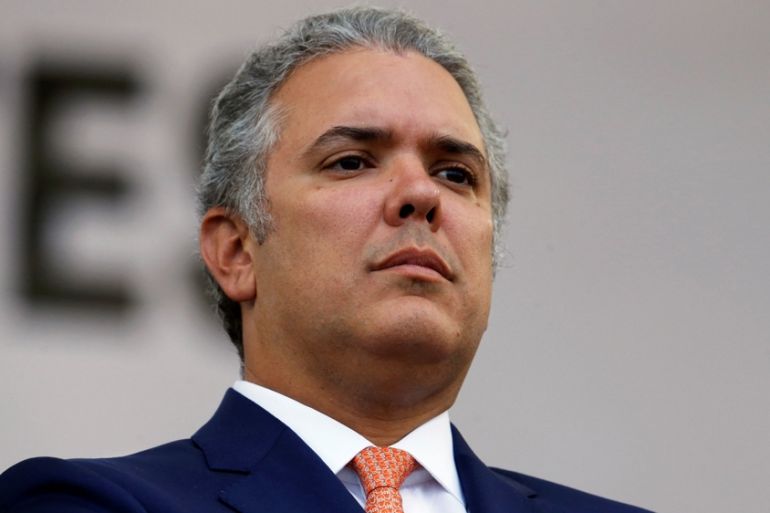Colombia to withdraw from pan-South American UNASUR bloc
Duque says the group of South American states acts as an accomplice to the ‘Venezuelan dictatorship’.

Colombian President Ivan Duque has announced his country’s withdrawal from the Union of South American Nations (UNASUR), a bloc set up a decade ago to counter US influence in the region.
Duque said the group acted as an accomplice to the “Venezuelan dictatorship” and said the move will be completed in six months.
Keep reading
list of 4 itemsGeorgia police break up protests against ‘foreign agents’ bill
Indian spies linked to killings, tracking dissidents abroad: What we know
‘I blame the government’: Poor Kenyans say no support amid record flooding
His announcement follows a decision by Colombia, Argentina, Brazil, Chile, Peru, and Paraguay, in April to temporarily suspend their membership of the organisation.
The 12-member bloc was created in 2008 to promote regional integration.
The late Venezuelan leader Hugo Chavez and other South American leaders opposed US-backed proposals for a Free Trade Area of the Americas, and instead set up UNASUR to help move their countries towards an economic and political union.
Before Colombia renounced its membership, Bolivia urged Duque to reconsider his position.
The remaining members are Venezuela, Bolivia, Ecuador, Uruguay, Guyana and Suriname.
Venezuela’s crisis
According to the UN, 1.6 million Venezuelans have fled the country since 2015, with 90 percent going to countries within South America.
Colombia has granted 800,000 of them temporary residence, but many want to travel onwards to Peru, Chile, or even Argentina, which has taken in more than 30,000 Venezuelans.
Duque has said all diplomatic approaches should be used to “isolate the regime” in Venezuela.
“The most important thing at this moment is that if the dictatorship does not end, the migration will not stop,” he told the British Broadcasting Corporation (BBC) News in an interview last week.
Governments initially welcomed the migrants with open arms, due to Venezuela’s role in welcoming those fleeing dictatorships and conflicts in the past.
But the exodus has ballooned this year, stretching social services, creating more competition for low-skilled jobs, and stoking fears of unrest.
In the past two weeks, both Ecuador and Peru announced tighter entry rules for Venezuelans, requiring Venezuelans to carry valid passports instead of just national ID cards.